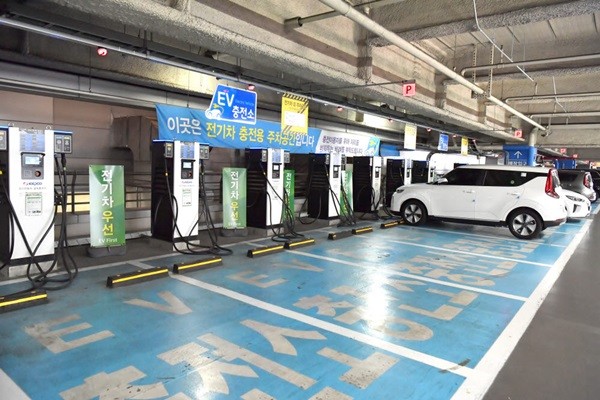Korea Electric Power Corporation (KEPCO) has become a South Korean business with the most charging stations for electric vehicles.
It already owns the most charging stations in South Korea although it feels like it just started installing charging stations in order to resolve blind spots according to the South Korean Government’s policy on supply of electric vehicles.
The industry, which is made up mostly by small companies, is showing concerns towards the expansion of B2C (Business to Consumer) business of KEPCO, which is practically the monopolistic electric power supplier in South Korea, as KEPCO decided to terminate its benefits for electric charges.
According to the industry, KEPCO currently operates 8,545 chargers in South Korea. Out of these chargers, 1,342 and 144 of them are rapid chargers (50 and 100kW) and slow chargers (7kW) respectively for public use. Also, 1765 and 5,294 of them are rapid chargers and slow chargers respectively for particular complex and facility users.
Based on the amount of capacity of chargers and the number of chargers, KEPCO is the biggest private-public business in South Korea when it comes to electric vehicle chargers.
It has more chargers than the Ministry of Environment (ME) that currently operates about 2,900 rapid chargers and “S” company (453 rapid chargers) and “P” company (about 8,500 slow chargers) that operate the most chargers within the private markets for rapid and slow chargers.
According to the South Korean Government’s policy in 2016, KEPCO has been installing infrastructures in apartment complexes, its offices, and national facilities where private companies have been hesitant to enter due to lack of demands. However, it has started to expand its business towards private facilities such as major department stores where private companies’ businesses have been focusing on.

After installing 36 and 55 rapid chargers at emart stores and Home plus stores respectively, KEPCO also installed 12 chargers recently at four Shinsegae department stores. As a result, it is now in direct competitions with private companies.
emart stores that currently have 447 chargers installed have Straffic (260), BMW and ChargEV (124), KEPCO (35), ME (22), and others competing against each other. KEPCO currently operates 130 rapid chargers at major department stores and discount stores and it has already secured major hotspots.
“As KEPCO has started to expand its business towards areas that are mostly made up of private companies, it has begun to have direct competitions against them.” said a representative for the industry. “It is unfair for KEPCO, which is the sole electric power supplier in South Korea, to carry out B2B (Business to Business) and B2C businesses at the same time. As a result, the South Korean Government needs to prepare standards for the market.”
Regarding this complaint, KEPCO explained that its business in electric vehicle charger focuses on accessibility of charging infrastructures in South Korea rather than profitability and that it wants to improve use of charging infrastructures.
“Although we are increasing the number of chargers at facilities that have excellent accessibility, we only want to expand and improve charging infrastructures and we are not looking to compete against private companies.” said a representative for KEPCO. “Although these chargers are installed and operated by us, we are cooperating with private companies in every matter so that our chargers charge fees and provide services as private companies please.”
The industry believes that the role of KEPCO within the market needs to be clear considering the future of the market.”
“While accessibility towards charging infrastructures has greatly improved since KEPCO has started to increase the number of its chargers, private companies are starting to feel threatened by it.” said Professor Choi Woong-cheol of Kookmin University’s Automotive Department. “Because KEPCO has a great advantage in this market as it is the sole electric power supplier of South Korea, the government needs to step in and establish the role of KEPCO within the market.”
Meanwhile, KECPO made a decision during a board meeting that was held at the end of last year to levy 50% of “basic electric charge ($2.09 (2,580 KRW) per kW) for electric vehicles” that had been exempted for three years between 2017 and 2019 starting from the July 1st. In case of 50kW rapid charger, half of $105 (130,000 KRW) will be levied starting from July while 75% and 100% will be levied starting from July of 2021 and July of 2022 respectively. Fee for using KEPCO’s charger that is paid on top of the basic electric charge will have its 50% discount benefit reduced in stages.
Staff Reporter Park, Taejoon | gaius@etnews.com & Staff Reporter Park, Joonho | junho@etnews.com